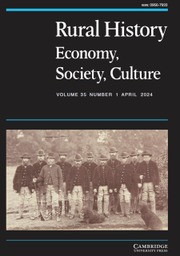No CrossRef data available.
Article contents
Caravans and Slide Shows: Rural Modernism in A Canterbury Tale
Published online by Cambridge University Press: 31 October 2008
Abstract
This essay uses the film A Canterbury Tale (The Archers, 1944) to consider the relationship between the countryside and modernity in English culture during the 1930s and 1940s. While previous analyses have argued that A Canterbury Tale film is unambiguously conservative, this paper adopts a Gramscian framework to suggest that its conservatism is intimately bound up with an emergent, modernising structure of feeling. The paper therefore studies those scenes in which the serene rurality of the narrative engages in a visual and aural dialogue with the modern world. The paper argues that three motifs in the film are particularly meaningful: the development of unexpected class and gender inflections in the concept of pilgrimage, the detachment of America from its status as a signifier of ‘bad’ modernity in the English countryside, and the incorporation of the cinematic into the rural.
- Type
- Research Article
- Information
- Copyright
- Copyright © Cambridge University Press 2001


